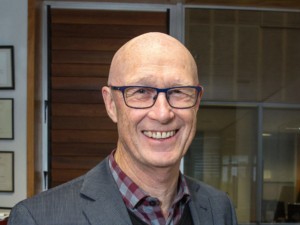- Home
- Research
- Te Kura i Awarua Rangahau Māori Centre
- Prominent research Professor joins EIT | Te Pūkenga research unit
Prominent research Professor joins EIT | Te Pūkenga research unit
 Professor Boyd Swinburn, a nutrition and global health expert, has joined Te Kura i Awarua, the EIT | Te Pūkenga Rangahau Māori Centre, to continue significant research into food security for children in Hawke’s Bay.
Professor Boyd Swinburn, a nutrition and global health expert, has joined Te Kura i Awarua, the EIT | Te Pūkenga Rangahau Māori Centre, to continue significant research into food security for children in Hawke’s Bay.
Professor Swinburn has been collaborating with EIT | Te Pūkenga Māori and Indigenous Research Professor David Tipene-Leach and a team of EIT researchers on the successful Nourishing Hawke’s Bay: He wairua tō te kai, a community research project, for a number of years. The project brings the added value of mātauranga Māori and systems science to intervention for children’s hauora (wellbeing).
Professor Swinburn, who is an internationally renowned University of Auckland Professor of Population Nutrition and Global Health, has now been contracted directly by EIT | Te Pukenga on a part-time basis for two years. He and Professor Tipene-Leach, along with a research team, will continue their evaluation of the impact on children’s health through the Ministry of Education’s free school lunch programme; Ka Ora, Ka Ako (KOKA). Professor Swinburn’s appointment and the continuation of the project are thanks to a significant two-year research grant from A Better Start E Tipu e Rea National Science Challenge. It is largest research grant the Polytech sector (now Te Pūkenga) has ever been awarded.
Professor Swinburn says he is pleased to join the team.
“I really relish this opportunity to work with communities where people know each other, great things are underway and you can really get things done. It’s an exciting place to be.”
He plans to divide his time between Auckland and Hawke’s Bay as he will still retain his role at Auckland University.
“Nourishing Hawke’s Bay started out as a joint project between EIT and Auckland University, but it made sense for EIT to be the institutional lead for this new large program of research, so a slice of my time will be leading this project with David Tipene-Leach for Te Pūkenga, EIT.”
The project is moving into a new phase by extending the research outside the KOKA programme to look at whānau, communities, and the region in an attempt to understand the food system in Hawke’s Bay and how to make changes towards healthy, sustainable and equitable regional food systems.
“Since we’ve got funding, we are finding people with research expertise who want to come back into the region, which is fantastic.”
“We’re fortunate that we’ve already done a good amount of groundwork in the research that we did. We’ve got a good sense of how rangatahi see their food environment that they’re having to engage with. The KOKA programme is the biggest nutrition intervention that we’ve had in generations, actually probably since school milk.
“This funding will allow us to dive into and create simulation models of the KOKA programme so that we can understand how to optimise it for multiple outcomes beyond nutrition and food security such as how to deal with food and packaging waste and optimise local employment in the programme.”
Professor Swinburn says the aim is for the project, over the next couple of years, to find ways for the Hawke’s Bay food systems to be reoriented to better serve the environment, the people, the society, as well as the economics for the region.
EIT | Te Pūkenga Māori and Indigenous Research Professor David Tipene-Leach says: “The collaboration with Auckland has been important. Contracting Boyd Swinburn into this project has made this a world leading player”.
EIT | Te Pūkenga Executive Dean, Professor Nat Waran, says: “We are delighted to be joined in this community centred research by someone with the expertise and standing of Professor Swinburn.”
“The calibre of the research team demonstrates the significance of the research locally, nationally and internationally. We are incredibly proud of the team, and the positive impact the work will have in creating a sustainable future for our communities.”
EIT | Te Pūkenga Executive Lead, Chris Collins says Professor Swinburn is a huge boost to the research capacity of Te Kura i Awarua and EIT | Te Pūkenga.
“Professor Swinburn is international renowned and together with Professor David Tipene-Leach and the team, has done good work on the Nourishing Hawke’s Bay: He wairua tō te kai project.”
“Having another Professor of national and international standing join our community-focused team is a credit to the research culture that EIT has built up over a couple of decades,” says Mr Collins.
